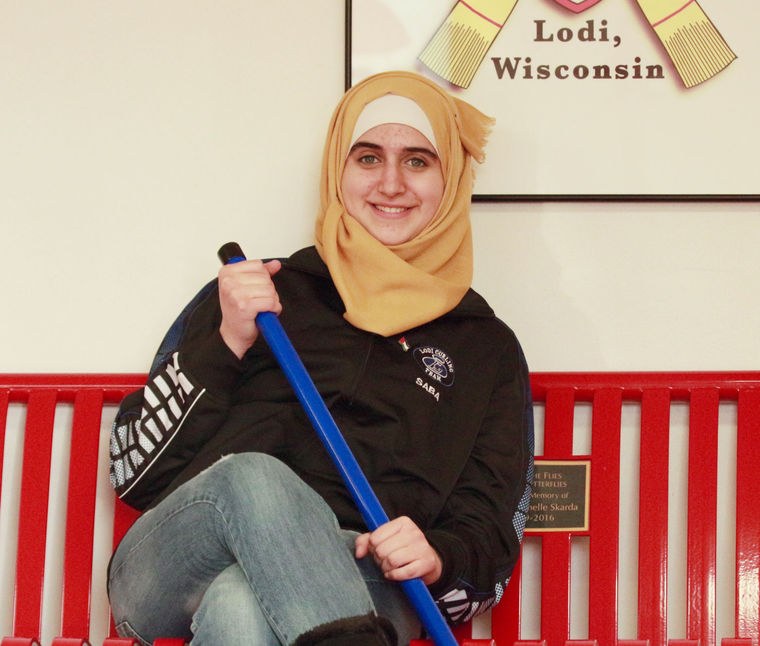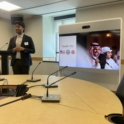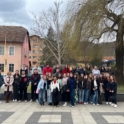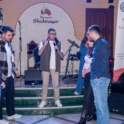Abdulaziz reflects on the highlights from serving as a mentor for CEW.
STORIES
From Palestine to Dairyland

This article was originally published in the Lodi Enterprise, a small newspaper covering community and local events in Lodi, Wisconsin. On May 15, 2017, YES student Saba Rjoub (YES 2016-2017, West Bank, hosted by FLAG in Lodi, WI), was featured in an article published by the Lodi Enterprise. For the original Lodi Enterprise article, please visit this link.
By Tamar Myers
When Palestinian exchange student Saba Rjoub learned she’d been placed with a family in Lodi, she Googled her new home and believed she was bound for California.
She traveled from Hebron to Washington D.C. for a three-day orientation – and finally noticed “Wisconsin” listed on her ticket.
“I looked it up and everyone was telling me they’re well known for their cheese,” Rjoub said. “And I felt, ‘Yes! I love cheese – oh my gosh, that’s the best thing.’”
Since that initial revelation, Rjoub has maintained a bubbly enthusiasm for all her American experiences, including making new friends, joining the curling and forensics teams – and finding a newfound love for cheese curds.
Coming to America
When Rjoub told her father she wanted to study abroad, he was reluctant.
“At first my dad said ‘no’, because it’s a completely different place and we didn’t know where I might be placed,” Rjoub said. “But in the same night he was like, ‘Well, if you want it go for it. It’s your life. And it’s an adventure.’”
And so, she applied for the competitive study abroad program in America and passed through a series of tests and interviews. In September, she was bound for Wisconsin.
Rjoub said she chose to travel to the U.S. because she wanted people to understand what it means to be Muslim and to better explain the Palestinian-Israeli conflict.
She’s been glad to be able to pass knowledge onto her friends here. She said hearing about issues secondhand is different from “when you … go interact, walk with them and live the same.”
Before her trip, she worried about experiencing anti-Muslim sentiment, something reported by two of her Palestinian friends who studied abroad in Arizona. But so far, she said people have been overwhelmingly friendly.
On her first day of school, she worried about having nowhere to sit at lunch, but Rjoub said she made friends quickly. And she began to witness American experiences, like Christmas Eve mass, football games and school dances.
“Homecoming was a new thing for me,” Rjoub said. “People are dancing and the first five minutes I was like, ‘oh my gosh what are they doing?’ … And then I got involved with all of my friends – it was fun.”
She joined the forensics team, and at the Capitol Conference Forensics Tournament placed second for her demonstration of how to speak Arabic.
At the encouragement of a friend, she joined the Lodi High School Curling Team. It took some time to appreciate.
“I watched videos on YouTube and I couldn’t understand it,” she said. “But when I went, it was so much fun.”
In November, Rjoub witnessed the American presidential election firsthand. And like many other experiences, she said she was elated. She said she was “so excited” to watch what elections are like in the U.S. and “how it was so stressful for people.”
“Words Can’t Explain”
Rjoub describes her home country of Palestine as “awesome.”
There, she lives in a large house in Hebron and has three brothers, three sisters and a nephew. She loves the big lights of the city and its large shopping malls and stores. In comparison to the large grocery stores at home, for instance, Piggly Wiggly is “really, really, really small.”
In her home country, Rjoub said academics are more high stakes. In 10th grade, students choose a track to study – science, literature or economics. She chose science, and her course load also includes French and English classes.
“In Palestine, you go to school, you study all day long and you might not finish,” she said.
Her school is different from the U.S. system – it’s separated by gender and teachers travel between classes. Students stay in one room with the same group of peers, so Rjoub gets to know her classmates well, and sits with her “squad” in class.
She’s accustomed to taking a course load full of advanced science classes, so now doing a senior year in America, she’s enjoyed dabbling in subjects like Film Appreciation and two different gym classes.
When she returns, she’ll finish one more year of high school in Palestine, to make up for her year abroad. No matter what, college is in her future.
“It’s a rule in my family,” Rjoub said. “You can’t do anything, you can’t marry, until you’re finished from college. At least you have to have a baccalaureate degree (the equivalent of an American bachelor’s degree). That’s my father’s rule.”
If she can get a scholarship, Rjoub said she would like to return to America for college or go to New Zealand or Beirut. She’s interested in studying engineering, government or forensic medicine. She’s especially interested in the latter, because she said in Palestine, there’s a lack of women in forensic medicine.
Though she was instructed to come into American with “zero expectations”, she admits she had a few – especially expecting to see city streets and taxis everywhere. But she adjusted quickly.
“I like living in a really small town,” she said. “I like how people know each other. People here, my friends’ families – they’re so nice.”





